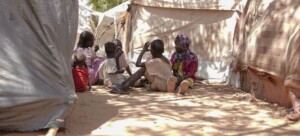Sudan’s military employed to enforce anti-Covid-19 measures
On Thursday, hundreds of members of the Sudanese army and the Rapid Support Forces militia were deployed in the streets in Khartoum to enforce the measures taken by the government to prevent the spread of the coronavirus. 67 new Covid-19 patients have been recorded, bringing the total of cases recorded in the country to 442. Residents of a quarantined village in Sennar complain about a lack of food and medicines.
 People in Khartoum are transported in a refrigetated van in clear violation of all coronavirus lockdown measures, April 19, 2020 (Social media)
People in Khartoum are transported in a refrigetated van in clear violation of all coronavirus lockdown measures, April 19, 2020 (Social media)
On Thursday, hundreds of members of the Sudanese army and the Rapid Support Forces militia were deployed in the streets in Khartoum to enforce the measures taken by the government to prevent the spread of the coronavirus. 67 new Covid-19 patients have been recorded, bringing the total of cases recorded in the country to 442. Residents of a quarantined village in Sennar complain about a lack of food and medicines.
On April 18, a lockdown was imposed in Khartoum for a period of three weeks. People are allowed to leave their homes for buying their daily needs between 6 am and 1 pm. Public transport has been banned. Only vehicles that have permission to move in the city, such as security and medical staff, are allowed.
Yet, social distancing as a precaution against the spread of the virus been under pressure. Long queues are witnessed each day in front of bakeries, selling points of cooking gas, and fuel stations, due to shortage of the commodities.
A number of people in the capital however seem not to take the precautions seriously. They ignore the measures, arrange transport themselves, and gather for demonstrations. On social media, supporters of the former regime headed by ousted President Omar Al Bashir, say that the coronavirus pandemic does not exist, and that the new government imposed the measures only to distract the people from the effects of the economic crisis in the country.
For this reason, the Council of Ministers decided last week to take more stringent measures to control the movement of people during the lockdown. Owners of vehicles that violate the measures will have their license revoked, the driver’s license will be withdrawn, and they will be brought to justice.
The Khartoum state Security Committee reported on Wednesday that the new measures include the deployment of soldiers and paramilitaries. Lt Gen Izzeldin El Sheikh, Director of Khartoum state Police, appealed to the people to fully comply with the directives of the Ministry of Health to preserve their safety.
In a television speech, Minister of Health Akram El Tom lectured the Sudanese people about their disregard of the measures taken by the government since mid-March to ward off the spread of the Covid-19 pandemic.
New cases, more measures
On Thursday, the Federal Ministry of Health announced 67 new cases of coronavirus, including three deaths, one in Khartoum and two in El Gezira. According to the official reports 31 people have died of the infectious disease.
So far, Khartoum registered 403 coronavirus patients, El Gezira 21 cases, El Gedaref four, River Nile state three. West Kordofan and Sennar have each reported two cases, Red Sea state, Northern State, White Nile state, Central, South, and East Darfur reported one patient each.
The Governor of Kassala, Maj Gen Mahmoud Babikir banned gatherings, the collective breaking of the Ramadan fasting, and congregational prayers in all mosques and squares on Thursday until further notice.
In Red Sea state, the authorities ordered the closure of shops and the markets of Port Sudan on 3 pm every day. Bakeries, pharmacies, and health institutions are excluded.
Other Sudanese states took similar measures earlier this week.
Deprived of food, medicines
The residents of El Amara El Jazouli, east of Sennar town, that was quarantined earlier this week after the emergence of a coronavirus patient in the village, complain about shortages of food and medicines.
Activist Yasir El Tom told Radio Dabanga that the village, populated by 140 families, is suffering from a severe shortage of supplies. The state government has not offered any assistance so far.
There are more than 30 people with chronic diseases who are in urgent need of medicines, he said. He called on the authorities to provide support “as soon as possible”.
Radio Dabanga’s editorial independence means that we can continue to provide factual updates about political developments to Sudanese and international actors, educate people about how to avoid outbreaks of infectious diseases, and provide a window to the world for those in all corners of Sudan. Support Radio Dabanga for as little as €2.50, the equivalent of a cup of coffee.












 and then
and then